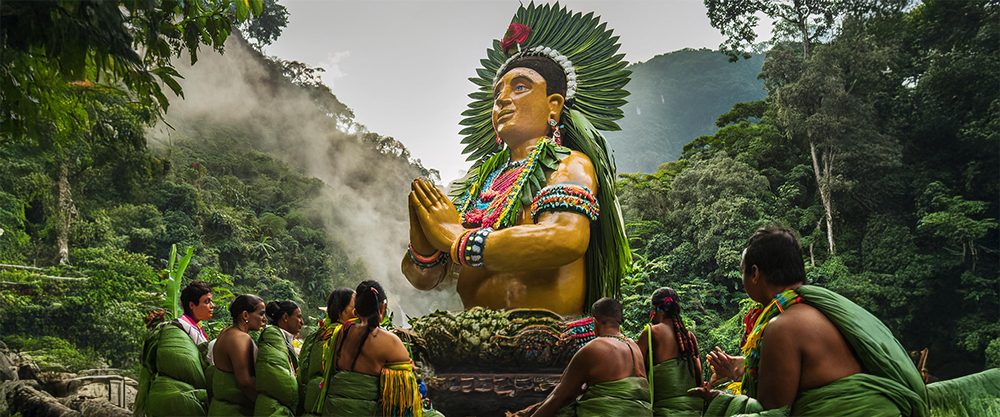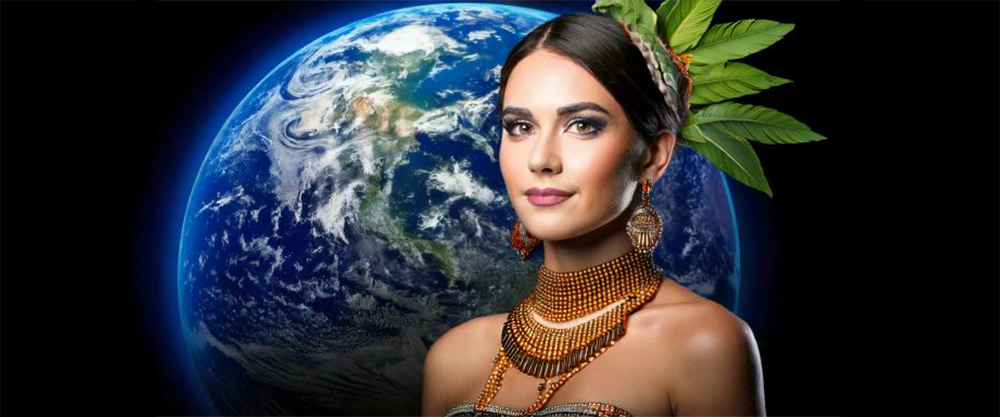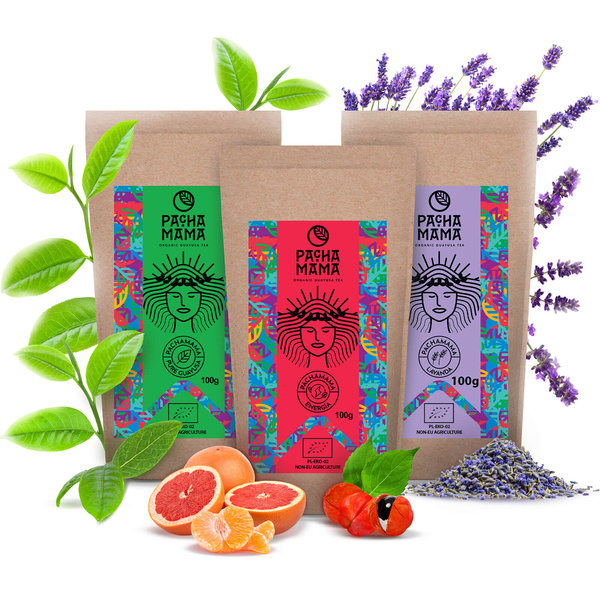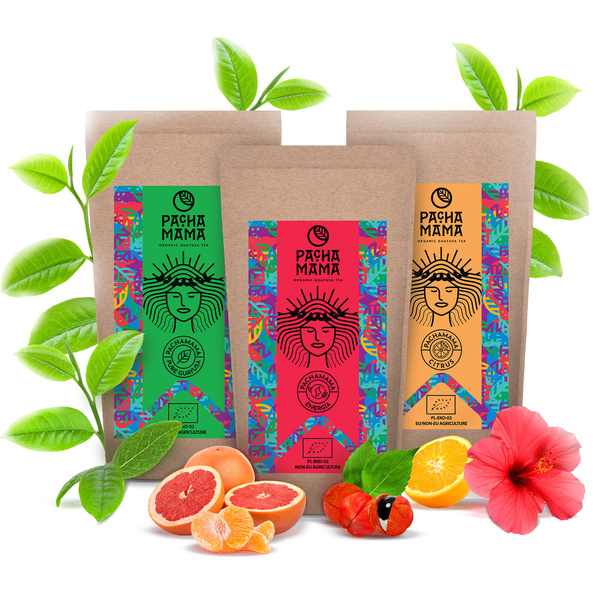Pachamama – the Incan goddess who inspires living in harmony with Nature

Yerba mate, guayusa, and the natural infusions made from them – are inseparable from the rich culture of South America. However, their long tradition is about more than just taste and stimulating properties. At the heart of ancient Indigenous tribes was a deep bond with nature, and its embodiment was Pachamama. Who is this mysterious goddess? Her legacy endures to this day, inspiring us to reach for natural, eco-friendly products that respect the balance of Mother Earth. Let’s explore the fascinating history of Pachamama and her significance in culture.
Summary:
- What is Pachamama?
- The cult of Pachamama in Incan culture. How was she worshipped?
- Pachamama in the modern world – more than just tradition
- Pachamama and guayusa – the perfect combination for nature lovers
Pachamama – who is she?
Pachamama, literally meaning "Mother Earth" in the Quechua language, was one of the most important goddesses in the pantheon of the ancient Incas. In the beliefs of the Indigenous peoples of South America, Pachamama symbolised the Earth as a living being – giving life, nourishment, and protection. She was the guardian of all nature, and her maternal care extended to humans, animals, and plants alike. In Incan cosmology, Pachamama coexisted with other important deities, such as Inti, the Sun god, who provided light and warmth necessary for crop growth, and Mama Quilla, the Moon goddess, "Mother Moon", symbolising time and the cycles of nature. Together, they created a harmonious world in which humans had an obligation to respect the laws of nature and express gratitude to the gods for their care.
The answer to the question "Pachamama – what is it?" is both simple and deeply rooted in the philosophy of Andean tribes. She is more than just a mythological figure – Pachamama is a living symbol of a culture that has revered the Earth as a source of life for thousands of years. For the peoples inhabiting the Andes, she was the protector of all living things. She ensured the physical survival of her "children" by providing abundant harvests and pure water. To this day, her symbol teaches respect for nature, which was the foundation of the spiritual life of her followers.
Pachamama was imagined as a powerful woman, who was both benevolent and formidable. She nurtured the land and its inhabitants with generosity but could also unleash harsh climatic conditions in anger over human exploitation of nature. She represented the cyclical nature of life – she could give life but also take it away. Her most common representation is as a woman with outstretched arms, surrounded by elements of nature: mountains, plants, and animals. Sometimes, she appeared as a young girl, other times an old woman. On occasion, she was depicted as a dragon-like creature. One of the most beautiful depictions of the goddess portrayed her as a pregnant woman, symbolising fertility, life, and growth.
With the arrival of Europeans in South America and the intense Christianisation of Indigenous communities, religious syncretism occurred. Many pre-Columbian beliefs and symbols were absorbed into the new religion, including the cult of Pachamama. In some regions, the goddess began to be associated with the Virgin Mary, taking on Christian attributes and being presented as the divine protector of the Earth and its people. Although elements of the old cult were partially transformed, Indigenous Andean people continued to worship Pachamama, blending traditional rituals with Catholic practices. Even today, in countries like Bolivia, Peru, and Ecuador, locals both make offerings to Pachamama and pray to the Virgin Mary, demonstrating the extraordinary adaptability of Indigenous spirituality.
💡 Pachamama is not just a mythological figure – today, she is a symbol of ecology, respect for nature, and harmonious coexistence with the world around us.

The cult of Pachamama in Incan culture. How was she worshipped?
The cult of Pachamama was widely practised among the peoples inhabiting present-day Peru, Bolivia, Ecuador, and Chile. In Incan culture, it was a true expression of respect for the Earth. The goddess symbolised harmony between humans and nature, which was reflected in numerous rituals and offerings. The Incas and other Andean tribes honoured her, showing gratitude and seeking her favour. One of the main elements of the cult was the act of "returning" – giving back a portion of what was taken from the Earth through gifts, ritual feasts, and prayers.
Offerings to Pachamama took various forms – from gifts of seeds, flowers, and coca leaves to food, animals, and valuable objects. These were placed in special holes in the ground as a symbolic way of giving thanks for harvests and blessings. Sometimes, during major celebrations, offerings were accompanied by elaborate ceremonies, including prayers and dances.
A key element of the cult was the celebration of the cycles of nature – harvests, sowing, and seasonal changes. This is why rituals held at the end of summer were particularly important – this time was considered Pachamama’s time. It was believed that the goddess was especially hungry then and needed to be honoured to ensure prosperity and health for both families and entire communities. People prayed to Pachamama, giving thanks for past yields and asking for future abundance.
Pachamama in the modern world – more than just tradition
Although the Incan Empire has long since disappeared, the cult of Pachamama has survived in the traditions of many Indigenous tribes. Moreover, her spirit still inspires many people worldwide to live in harmony with nature and protect our planet. Pachamama has become a symbol of ecology and sustainable living – reminding us that the Earth is not merely a resource to be exploited, but a living entity that deserves care and respect.
Many contemporary environmental movements and Indigenous communities refer to the concept of Pachamama as a spiritual guardian of nature and uphold her values, promoting harmonious coexistence between humanity and the environment. Modern celebrations associated with Pachamama, such as "Día de la Pachamama" in South American countries, encourage us to reflect on our impact on the planet and take conscious actions to protect the natural world.
Although Pachamama is most commonly associated with South America, her philosophy is gaining popularity worldwide. Contemporary ecological movements, such as zero waste and slow life, align with the philosophy of harmonious living with nature. Increasingly, communities around the world are adopting similar approaches – drawing inspiration from Andean beliefs, learning to live consciously in rhythm with nature, and reducing humanity’s negative impact on the planet.

Pachamama and guayusa – the perfect combination for nature lovers
Inspired by the extraordinary figure of the Incan goddess, a series of organic, certified guayusa-based infusions was created – Guayusa Pachamama. This is top-quality guayusa tea sourced directly from Ecuador, full of natural ingredients, without artificial additives. These products draw spiritual inspiration from Pachamama’s symbolism, offering natural support for both body and mind.
Guayusa (Latin: Ilex guayusa) consists of leaves from a tree native to the Amazon rainforest, particularly in Ecuador and Peru. Unlike yerba mate (Ilex paraguariensis), which is more commonly consumed in South American countries such as Argentina, Brazil, Paraguay, and Uruguay, guayusa tea has traditionally been used by Amazonian tribes in the northern part of the continent. Like yerba mate, guayusa contains caffeine, but its effect is often described as gentler and more stable. A guayusa infusion is perfect both for starting a busy day and for late-afternoon meditation or mental work.
One of guayusa’s distinguishing features is its flavour profile. Unlike yerba mate, which can be intense, bitter, and smoky, guayusa offers a milder, herbal, slightly sweet and earthy taste, making it well tolerated even by those who dislike traditionally bitter infusions. The presence of theobromine – a natural compound also found in cocoa – enhances feelings of relaxation and well-being after drinking the infusion. That’s not all! Guayusa is also rich in antioxidants, which help to neutralise the harmful effects of free radicals, contributing to long-term health. Moreover, guayusa contains L-theanine – an amino acid known for supporting concentration and reducing stress. These properties make guayusa an excellent choice not only for enthusiasts of natural stimulants, but also for those seeking to balance physical and mental energy.
📊 Guayusa tea vs. yerba mate – key differences
| FEATURE | GUAYUSA TEA | YERBA MATE |
|---|---|---|
| Country of origin | Ecuador, Peru | Argentina, Brazil, Paraguay |
| Flavour | Mild, slightly sweet, herbal | Intense, bitter, smoky |
| Caffeine content | High but balanced | Less than guayusa but with a more intense effect |
| Additional compounds | L-theanine | Saponins |
| Stimulant effect | Gentle, long-lasting energy release | A strong energy “kick,” more balanced than coffee |
👉 You can read more about guayusa tea on our blog: Guayusa vs. yerba mate – what to choose?
To summarise, guayusa and yerba mate share a common goal – boosting the body’s energy and supporting daily vitality – but they achieve it in different ways. Yerba mate provides an intense energy surge and a stronger taste, traditionally consumed in a mate gourd, whereas guayusa offers a milder flavour and a more balanced energy release.
The Pachamama brand’s guayusa infusions pay tribute to the unique ecological and spiritual culture of the Amazon. Inspired by the values of the goddess Pachamama – symbolising harmony, environmental protection, and respect for natural resources – they provide a product that not only supports a daily diet but also reminds us of the need to care for our planet. If you are looking for a healthy, natural drink that will bring balance to your life and energise you throughout the day, Guayusa Pachamama is an excellent choice!
Sources of information:
- Wikipedia: Pachamama, Día de la Pachamama.
- E. R. Zaffaroni, La naturaleza como persona: de la Pachamama a la Gaia, En Bolivia: Nueva Constitución Política del Estado. Conceptos elementales para su desarrollo normativo, 2010.
- Encyclopaedia Britannica.




